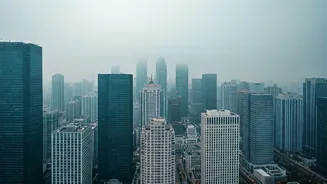Smog's Grim Reality
The air quality index (AQI) readings across Delhi have hit alarming levels, primarily due to the dense smog. A majority of monitoring stations have reported
AQI values exceeding 400. This starkly represents very poor air quality, posing significant health hazards. In such conditions, everyone, irrespective of their health status, is susceptible to respiratory issues. The situation calls for urgent public awareness and implementing effective measures to reduce pollution and mitigate the health impact on the city’s population. The data underscores the pressing need for long-term strategies to tackle the pollution menace.
Impact of Pollution
The immediate impact of such high pollution levels is an increase in respiratory problems. Residents are more prone to coughing, wheezing, and experiencing difficulty breathing. Prolonged exposure can worsen existing conditions like asthma and chronic bronchitis. Furthermore, the pollutants in the air can trigger various allergic reactions. Children, elderly individuals, and those with pre-existing respiratory issues are particularly vulnerable. The high AQI also indicates a rise in cardiovascular problems. The current conditions serve as a crucial reminder of the importance of adopting protective measures and understanding the long-term repercussions of air pollution.
Taking Protective Steps
Given the severity of the smog, it's vital to adopt protective measures to reduce exposure. Minimizing outdoor activities, especially during peak pollution hours, is essential. Wearing N95 or higher-grade masks, which filter out particulate matter, is recommended when venturing outside. Monitoring local air quality reports provides an understanding of the current conditions and allows individuals to plan their activities accordingly. Staying hydrated and avoiding strenuous activities can help alleviate some of the health impacts. Following government advisories and staying informed about the current air quality can also prove to be extremely helpful.
Seeking Informed Action
The current crisis demands proactive steps from both individuals and the government. Implementing measures to control vehicular emissions, such as promoting public transport and electric vehicles, can significantly curb pollution levels. Strict enforcement of existing pollution control regulations is crucial. Investing in public awareness campaigns to educate residents about the effects of air pollution and the protective measures they can take is also important. The combined efforts of individuals, civic bodies, and government agencies will be essential in combating this environmental hazard.





















